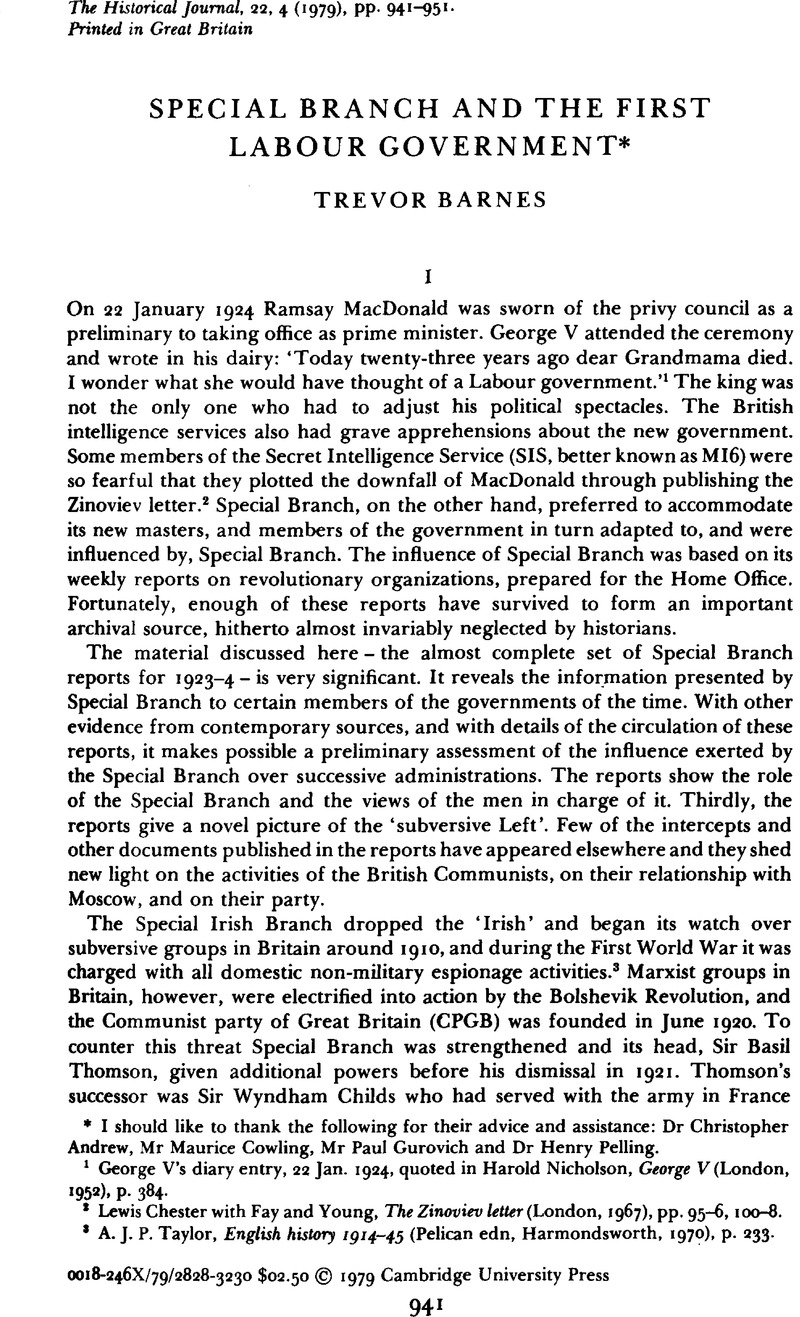Article contents
Special Branch and the First Labour Government*
Published online by Cambridge University Press: 11 February 2009
Abstract

- Type
- Communications
- Information
- Copyright
- Copyright © Cambridge University Press 1979
References
2 Chester, Lewis with Fay and Young, The Zinoviev letter (London, 1967), pp. 95–6, 100–8Google Scholar.
3 Taylor, A. J. P., English history 1914–45 (Pelican edn, Harmondsworth, 1970), p. 233Google Scholar.
4 SirChilds, Wyndham, Episodes and reflections (London, 1930), pp. 83, 132, 175, 239, 241Google Scholar.
5 ‘Correspondent's report’, no. 194, 22 Feb. 1923. special Branch reports between 4 Jan. 1923 and 10 Jan. 1924 inclusive are numbered 187–238, Cabinet Memoranda, Cab. 24/158 to Cab. 24/164. Reports for the period of the Labour government are in the Ramsay MacDonald papers: P.R.O. 30/69, 1/220 and 1/221. A few of these latter reports are unaccountably missing.
6 Childs, Episodes, pp. 209–12.
7 Ibid. p. 209.
8 Report on HOR Committee meeting on 15 Dec. 1924. F.O. 371/10480.
9 Ullman, Richard H., Anglo-Soviet relations, vol. 3: The Anglo-Soviet accord (London, 1972), P. 303Google Scholar.
10 Workers' Weekly circulation from anonymous source, letter from CPGB to distribution committees, no. 224, 17 Sept. 1923.
11 No. 187, 4 Jan. 1923, for the report about £80,000: Childs gave no source. Tom Bell to Manchester district secretary, 12 Jan. 1923, no. 189, 18 Jan. 1923.
12 No. 230, 8 Nov. 1923.
13 No. 232, 22 Nov. 1923.
14 Reports from chief constable of Norfolk on the strike of Norfolk agricultural workers, no. 201, 12 Apr. 1923 and no. 203, 26 Apr. 1923; London district party committee to W. Sturrock (undated), no. 214, 12 July 1923.
15 ‘Memorandum of the Communist International on the revolutionary situation in Europe’, no. 220, 30 Aug. 1923.
16 Cabinet conclusions 21 (23), 8, 25 Apr. 1923.
17 Davidson, J. C. C., Memoirs of a Conservative: J. C. C. Davidson's memoirs and papers 1910–37, ed. James, R. R. (London, 1969), p. 179Google Scholar.
18 Kalinin to British bureau, no. 198, 22 Mar. 1923.
19 Young's report, no. 198, 22 Mar. 1923.
20 Chester, Fay and Young, Zinoviev letter, p. 108.
21 Ramsay MacDonald papers, PRO 30/69, 1/221; covering letter from Childs to Gower (MacDonald's P. P. S.), 1 Feb. 1924, P. R. O. 30/69, 1/220.
22 E. g. 170, HC Deb, 5s, cols. 2526–7, 13 Mar. 1924.
23 On the industrial disputes generally: Lyman, R. W., The first Labour government (London, 1957), pp. 218–23Google Scholar; Marquand, David, Ramsay MacDonald (London, 1977), pp. 318–20Google Scholar. Cabinet conclusions 27 (24), 8, 15 Apr. 1924; ‘Report of the Committee on Industrial Unrest’ with Henderson's memo, marked ‘most secret’, Cab. 24/166, 273 (24); Cabinet conclusions, 32 (24), 15 May 1924.
24 Davidson, Memoirs, pp. 179–80.
25 Memo, by J. D. Gregory, 8 Jan. 1924, quoted in Andrew, Christopher M., ‘The British secret service and Anglo-Soviet relations in the 1920s’, part 1, Historical Journal, xx (1977), 673–706CrossRefGoogle Scholar.
26 No. 253, 1 May 1924; cf.Andrew, ‘British secret service’, pp. 698–9.
27 Mounsey to Home Office, 12 May 1924, F. O. 371/10478. Prem 1/49.
28 Minute by Horwood, 16 May 1924, with letter from Zinoviev to CPGB Exec, 17 Mar.: Prem 1/49. The Home Office's sluggishness over this letter is difficult to explain beyond doubt because the report of 10 April 1924 is missing. If the letter appeared in this the concern of Henderson with the one dated 7 April, which was more moderate in tone, is puzzling, as is the fact that it was not referred to in the correspondence with the Foreign Office. The alternative is that Special Branch kept back knowledge of the 17 March letter from the Home Office until an opportune moment arrived for using it to persuade the government to take action. If this was the case Horwood and Childs were doomed to disappointment.
29 173, HC Deb, 19 May 1924, col. 1809; 174, HC Deb, 19 June 1924, cols. 2297–8.
30 Police reports, postal intercepts, no. 266, 7 Aug. 1924.
31 Jones, Thomas, Whitehall diary, vol. I: 1916–24, ed. Middlemas, K. (London, 1969), pp. 287–98Google Scholar.
32 No. 253, 1 May 1924.
33 No. 271, 11 Sept. 1924.
34 At his first audience with the king, MacDonald asked George V to understand ‘the very difficult position he was in vis-à-vis to his own extremists’: Nicholson, George V, p. 386.
35 No. 271, 11 Sept. 1924.
36 McKibbin, Ross, The evolution of the Labour party 1910–24 (Oxford, 1974), pp. 195–6, 203Google Scholar; no. 275, 9 Oct. 1924.
37 MacDonald's, diary entry, 31 10 1924, quoted in Marquand, MacDonald p. 383Google Scholar.
38 Thomas, J. H. in The Times, 5 03 1928, quoted in Andrew, ‘British secret service’, pp. 696–7Google Scholar.
39 Police report, no. 267, 14 Aug. 1924.
40 Workers' Weekly, 18 Apr. 1924; The Times, 19 Nov. 1924; 173, HC Deb 5s, 22 May 1924, col. 2431.
41 Taylor, English history, p. 790.
42 Clynes, J. R., Memoirs (London, 1937), pp. 343–4Google Scholar.
- 4
- Cited by




